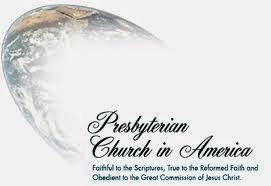 Please join us as we begin a new study this quarter in the adult Sunday school class, The Doctrine of the Church. If you missed the first class or would like to listen over the 'net, week one can be heard or downloaded here. Below is a schedule for the quarter. We look forward to your comments.
Please join us as we begin a new study this quarter in the adult Sunday school class, The Doctrine of the Church. If you missed the first class or would like to listen over the 'net, week one can be heard or downloaded here. Below is a schedule for the quarter. We look forward to your comments.
THE CHURCH SYLLABUS
1. KING AND
HEAD OF THE CHURCH
1. Doctrine
explained
2. Lord of
conscience
3. Errors
2. NATURE OF
THE CHURCH
1. Visible and
invisible
2. Militant and
triumphant
3. Organism and
organization
4. Particular
and mission
3. NATURE OF
THE CHURCH (CONT.)
1. Unity
2. Catholicity
3. Apostolicity
4. Indestructibility
4. MARKS OF THE
CHURCH
1. Word and
sacrament
2. Belief and
practice
3. Purity
5. POWER OF THE
CHURCH
1. Spiritual
2. Ministerial
& declarative
3. Constitution
4. Terms of
admission
5. Qualifications
of officers
6. GOVERNMENT
OF THE CHURCH
1. Presbyterianism
2. Church
members
3. Church
officers
4. Church
courts
5. Church
orders
7. DISCIPLINE
OF THE CHURCH
1. Nature
2. Subjects
3. Ends
4. Offenses
5. Censures
6. Appeals
7. Complaints
8. WORSHIP OF
THE CHURCH
1. Nature of
worship
2. Keys of the
Kingdom
3. Regulative
Principle
4. Worship
specifics
a. Elements
b. Forms
c. Circumstances
9. WORSHIP OF
THE CHURCH (CONT.)
1. Ministry of
the Word
a. Preaching
b. Reading
c. Confessing
2. Praise and
prayer
3. Collection
4. Call to
Worship
5. Benediction
10. SACRAMENTS OF
THE CHURCH
1. Baptism
2. Lord’s
Supper
3. Lord’s Day
11. COMMUNION OF
THE CHURCH
1. Communion
with Christ
a. Foundation
b. Nature
c. Manner
2. Communion of
saints
a. Holy
fellowship
b. Spiritual
services
c. Mutual
relief
d. Private
property
12. MINISTRY OF
THE CHURCH
1. Evangelism
2. Mercy
3. Education
4. Women
5. Children
13. HISTORY OF
THE CHURCH
1.
NT Church
2. Presbyterian
Church in America
3. Redeemer
Church










